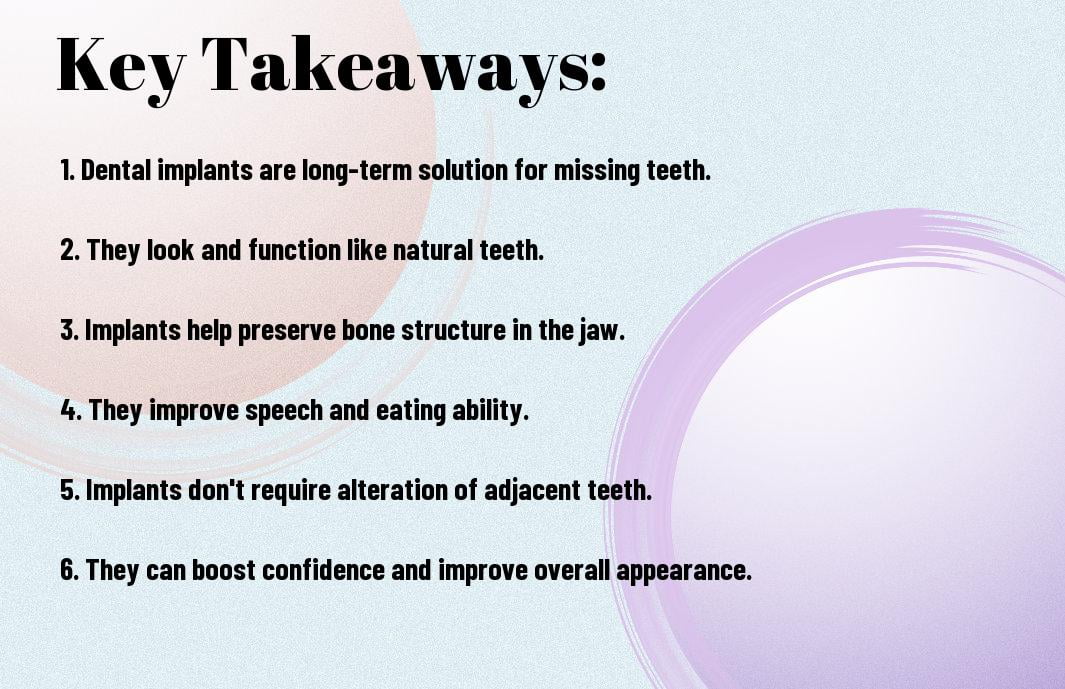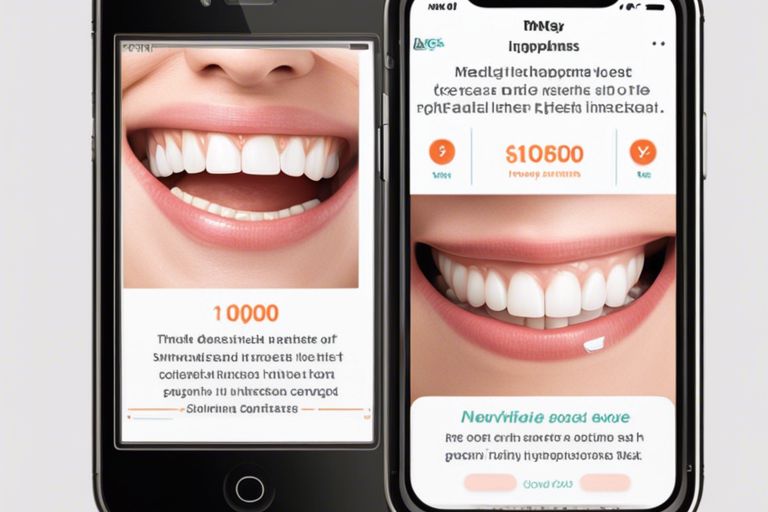Have you been considering replacing your missing teeth with dental implants? If so, you’ve come to the right place. Dental implants have become the most sought-after solution for replacing missing teeth due to their long-term success rate and numerous benefits. They not only restore your smile, but they also improve your overall oral health. With proper care and maintenance, dental implants can last a lifetime, making them a permanent solution to the problem of missing teeth. In this informative blog post, we will explore the various benefits of dental implants and why they are the ideal choice for replacing your missing teeth.
Key Takeaways:
- Dental implants are a durable and long-lasting solution for replacing missing teeth.
- Implants provide stability and function just like natural teeth, allowing for normal chewing and speaking abilities.
- Implants stimulate the jawbone, preventing bone loss and preserving facial structure.
- Dental implants do not require alteration of surrounding teeth, unlike traditional bridges.
- Implants can improve overall oral health and boost self-confidence by restoring a natural-looking smile.
The Anatomy of Dental Implants
Obviously, before getting dental implants, it’s important to have a good understanding of their anatomy. Dental implants are comprised of three essential components that work together to provide a stable foundation for replacement teeth. These components include the implant fixture, abutment, and the artificial tooth or crown.
Components of a Dental Implant
When you opt for dental implants, the implant fixture is the first component that is surgically placed into your jawbone. This serves as the root for your replacement tooth and is typically made of titanium, a biocompatible material that allows the implant to fuse with the jawbone, providing a strong and stable foundation. The abutment is then attached to the implant fixture and acts as a connector for the artificial tooth or crown, which is custom-made to match your natural teeth in shape and color.
The Surgical Procedure
During the surgical procedure, the implant fixture is carefully placed into the jawbone, typically under local anesthesia. It is important to note that this process requires a healing period to allow the implant to fuse with the bone, a process known as osseointegration. While the surgical procedure may sound intimidating, it is relatively safe and has a high success rate when performed by a qualified and experienced dental professional.
Benefits of Dental Implants
Despite the various options available for replacing missing teeth, dental implants are a top choice for many individuals. There are several benefits that come with choosing dental implants over other solutions.
Improved Oral Functionality
When you are missing teeth, it can greatly affect your ability to chew and speak properly. Dental implants function just like natural teeth, allowing for improved oral functionality. You won’t have to worry about discomfort or difficulty with eating and speaking, which can significantly impact your overall quality of life.
Aesthetics and Comfort
Dental implants are designed to look and feel like your natural teeth, providing a high level of comfort and aesthetics. You won’t have to worry about feeling self-conscious about your smile or dealing with discomfort that can come with other teeth replacement options. With dental implants, you can regain your confidence and enjoy a natural-looking smile.
Long-term Oral Health
One of the key benefits of dental implants is their ability to promote long-term oral health. Unlike other tooth replacement options, dental implants don’t require the alteration of adjacent teeth. This means that your natural teeth are left untouched, promoting better long-term oral health and preserving the integrity of your remaining teeth.
Durability and Success Rates
Dental implants are known for their exceptional durability and high success rates. They are designed to last for many years, providing a long-term solution for missing teeth. With proper care, dental implants can offer a permanent and reliable tooth replacement option, giving you peace of mind and confidence in your smile.
Comparing Dental Implants to Other Dental Prostheses
Unlike other dental prostheses, dental implants offer a more permanent and natural-looking solution for replacing missing teeth. They provide a strong foundation for fixed (permanent) or removable replacement teeth that are made to match your natural teeth. If you want to learn more about the benefits of dental implants, check out this 3 Reasons to Replace a Missing Tooth With Dental Implants article.
| Dental Implants | Other Dental Prostheses |
| Permanently fixed in your jawbone | May require adhesives or clasps for stability |
| Stimulate natural bone growth | Do not prevent bone loss |
| Long-lasting and durable | May need replacement or adjustments over time |
Dental Implants vs. Bridges
When comparing dental implants to bridges, you’ll find that implants are a more permanent solution. With bridges, the neighboring teeth need to be prepared and capped to support the bridge, which can weaken those teeth over time. In contrast, dental implants don’t rely on neighboring teeth for support, making them a healthier option for your smile in the long run.
Dental Implants vs. Dentures
If you’re debating between dental implants and dentures, consider that implants offer better stability and function. Dentures can often slip or click while speaking or eating, causing embarrassment and discomfort. With dental implants, you won’t have to worry about these issues. Additionally, implants help preserve your jawbone and prevent deterioration, a common problem associated with wearing dentures for a prolonged period.
Preparing for Dental Implants
To ensure the success of your dental implant procedure, there are specific steps you need to take to prepare for the treatment. This involves a thorough evaluation to determine your candidacy and careful consideration of pre-surgical factors.
Candidate Evaluation
Before undergoing dental implant surgery, it’s essential to undergo a comprehensive evaluation to determine if you are a suitable candidate for the procedure. This assessment typically involves a thorough examination of your oral health, including the condition of your gums, remaining teeth, and jawbone. Your overall health and medical history will also be taken into consideration to ensure that there are no underlying conditions that could complicate the surgery or affect the healing process. In some cases, additional imaging tests such as X-rays or CT scans may be necessary to assess the structure of the underlying bone and determine the optimal placement of the implants.
Pre-Surgical Considerations
Prior to your dental implant surgery, there are several pre-surgical considerations that you need to keep in mind. It’s important to discuss any medications you are currently taking with your dentist or oral surgeon, as certain medications may need to be adjusted or temporarily discontinued to minimize the risk of complications during the procedure. Additionally, if you are a smoker, it’s strongly advised that you quit smoking prior to the surgery, as smoking can significantly impede the healing process and increase the risk of implant failure. Your dentist may also provide specific pre-operative instructions, such as dietary restrictions or oral hygiene protocols, to ensure that you are adequately prepared for the surgery.
Post-Implant Care and Maintenance
Your new dental implants require proper care and maintenance to ensure their longevity and success. Following your implant surgery, it is important to adhere to specific guidelines for immediate post-surgical care. Additionally, long-term care and maintenance will be crucial for the ongoing health and stability of your dental implants.
Immediate Post-Surgical Care
After your dental implant surgery, it is essential to follow the instructions provided by your dentist or oral surgeon for optimal healing. This includes managing any discomfort with prescribed medications, adhering to a soft diet, and avoiding strenuous activity for the first few days. Furthermore, maintaining good oral hygiene by gently brushing and rinsing with a prescribed mouthwash is crucial to prevent infection and promote healing at the surgical site. Your dentist will also provide specific instructions on when to return for a follow-up appointment to monitor your progress.
Long-Term Care and Maintenance
Once your dental implants have fully healed and integrated with your jawbone, ongoing care and maintenance are essential to ensure their longevity. It is important to maintain a diligent oral hygiene routine, including brushing at least twice a day, flossing daily, and using an antimicrobial mouthwash to prevent plaque buildup and gum disease. Regular dental check-ups and cleanings are also important for monitoring the health of your implants and addressing any issues before they become serious. Avoiding tobacco use and limiting consumption of staining substances such as coffee and red wine can help preserve the appearance of your implants and surrounding teeth. By following these guidelines, you can maintain the health and function of your dental implants for many years to come.
Conclusion
With these considerations, it is clear that dental implants offer a range of benefits for replacing missing teeth. Not only do they provide a natural-looking and long-lasting solution, but they also help to maintain the structure of your jaw and surrounding teeth. Additionally, dental implants can improve your overall oral health and restore your ability to chew and speak comfortably. If you are considering replacing your missing teeth, dental implants are a viable option that can greatly enhance your quality of life.
FAQ
Q: What are dental implants?
A: Dental implants are permanent artificial tooth roots that are surgically placed in the jawbone to support a replacement tooth or bridge. They provide a strong foundation for fixed or removable replacement teeth, mimicking the natural function and appearance of a real tooth.
Q: What are the benefits of dental implants for replacing missing teeth?
A: Dental implants offer several benefits for individuals with missing teeth. They provide a long-term solution that can last a lifetime with proper care. Implants also help maintain the health and integrity of the jawbone, prevent surrounding teeth from shifting, and restore the ability to chew and speak properly. Additionally, they look and feel like natural teeth, enhancing the overall appearance and confidence of the individual.
Q: Who is a suitable candidate for dental implants?
A: Generally, individuals with good oral and overall health who have an adequate amount of jawbone are suitable candidates for dental implants. However, certain medical conditions, such as uncontrolled diabetes, cancer, or active gum disease, may affect the success of the implant procedure. It is important to consult with a dentist or oral surgeon to determine if dental implants are a viable option for replacing missing teeth.







